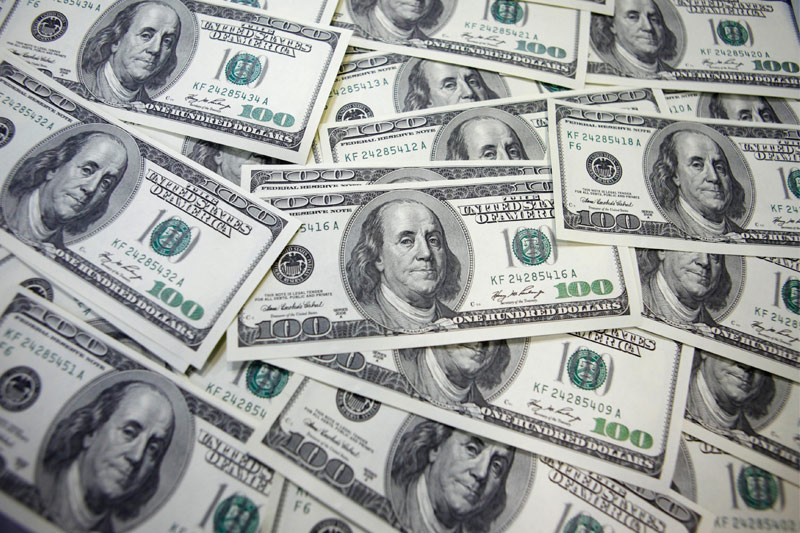Investing.com - The dollar extended gains against most major currencies on Wednesday, as growing uncertainty in Europe continued to send investors racing to the greenback as a safety play.
The euro was lower against the dollar in Asian trading on Wednesday, with EUR/USD down 0.23% and trading at 1.2976.
Election results in France and Greece over the weekend sent investors running for cover in the U.S. dollar, a traditionally safe-haven currency, as the fallout continued to repel investors away from risk.
In France, socialist Francois Hollande defeated President Nicolas Sarkozy, as voters rejected austerity measures supported by the outgoing administration and opted to embrace Hollande's calls to prioritize growth over cutting spending.
Concerns are brewing that while Europe's economic motor and austerity champion Germany will welcome a Hollande victory, relations won't be as cozy between the two nations as they were under Sarkozy, at least when it comes to navigating Europe out of the debt crisis.
In Greece, the country's leading political parties failed to secure 50% of the votes in parliamentary elections last weekend, with smaller, fringe parties taking a larger slice of the electoral pie.
Concerns are brewing that Greek political parties won't agree on a coalition government by June, when a tranche of bailout money is due, especially growing sentiment that more and more policymakers have had enough with austerity measures like layoffs and spending cuts.
Critics of austerity say the pain associated with trimming deficits and paying down debts doesn't lead to fundamental improvements to the economy they were supposed to bring.
It wasn't all bad news.
German production data cushioned the euro somewhat and prevented the unit from falling too far.
German industrial output jumped 2.8% in March, well above expectations 0.8% increase, after declining 0.3% in February.
Housing starts in Canada, meanwhile, came in better than expected at 244,900 units in April, the highest figures in five years, and far above market forecasts for 204,000 and March's figure of 214,800 units.
Still, the dollar reigned supreme during the risk-off global trading session.
The greenback, meanwhile, was up against the pound, with GBP/USD down 0.15% and trading at 1.6134.
The U.S. currency was up against the yen, with USD/JPY trading up 0.02% at 79.89, and up against the Swiss franc, with USD/CHF up 0.23% and trading at 0.9258.
The dollar was up against its counterparts in Canada, Australia and New Zealand, with USD/CAD up 0.18% at 1.0005, AUD/USD down 0.46% at 1.0073 and NZD/USD down 0.38% at 0.7848.
The dollar index, which tracks the performance of the greenback versus a basket of six other major currencies, was up 0.20% at 80.09.
Later Wednesday, the U.S. is to produce government data on crude oil stockpiles.
The country is also to hold a 10-year government bond auction.
The euro was lower against the dollar in Asian trading on Wednesday, with EUR/USD down 0.23% and trading at 1.2976.
Election results in France and Greece over the weekend sent investors running for cover in the U.S. dollar, a traditionally safe-haven currency, as the fallout continued to repel investors away from risk.
In France, socialist Francois Hollande defeated President Nicolas Sarkozy, as voters rejected austerity measures supported by the outgoing administration and opted to embrace Hollande's calls to prioritize growth over cutting spending.
Concerns are brewing that while Europe's economic motor and austerity champion Germany will welcome a Hollande victory, relations won't be as cozy between the two nations as they were under Sarkozy, at least when it comes to navigating Europe out of the debt crisis.
In Greece, the country's leading political parties failed to secure 50% of the votes in parliamentary elections last weekend, with smaller, fringe parties taking a larger slice of the electoral pie.
Concerns are brewing that Greek political parties won't agree on a coalition government by June, when a tranche of bailout money is due, especially growing sentiment that more and more policymakers have had enough with austerity measures like layoffs and spending cuts.
Critics of austerity say the pain associated with trimming deficits and paying down debts doesn't lead to fundamental improvements to the economy they were supposed to bring.
It wasn't all bad news.
German production data cushioned the euro somewhat and prevented the unit from falling too far.
German industrial output jumped 2.8% in March, well above expectations 0.8% increase, after declining 0.3% in February.
Housing starts in Canada, meanwhile, came in better than expected at 244,900 units in April, the highest figures in five years, and far above market forecasts for 204,000 and March's figure of 214,800 units.
Still, the dollar reigned supreme during the risk-off global trading session.
The greenback, meanwhile, was up against the pound, with GBP/USD down 0.15% and trading at 1.6134.
The U.S. currency was up against the yen, with USD/JPY trading up 0.02% at 79.89, and up against the Swiss franc, with USD/CHF up 0.23% and trading at 0.9258.
The dollar was up against its counterparts in Canada, Australia and New Zealand, with USD/CAD up 0.18% at 1.0005, AUD/USD down 0.46% at 1.0073 and NZD/USD down 0.38% at 0.7848.
The dollar index, which tracks the performance of the greenback versus a basket of six other major currencies, was up 0.20% at 80.09.
Later Wednesday, the U.S. is to produce government data on crude oil stockpiles.
The country is also to hold a 10-year government bond auction.
